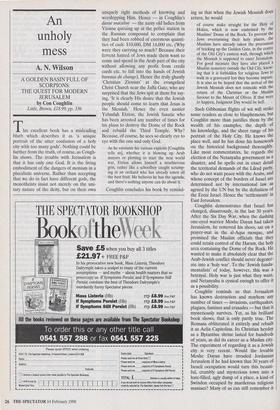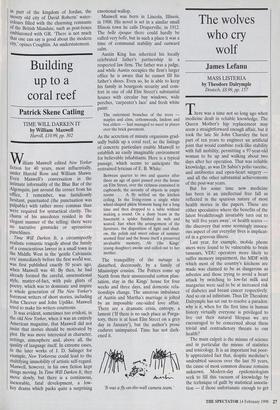An unholy mess
A. N. Wilson
A GOLDEN BASIN FULL OF SCORPIONS: THE QUEST FOR MODERN JERUSALEM by Con Coughlin Little, Brown, .f18.99, pp. 336 This excellent book has a misleading blurb which describes it as 'a unique portrait of the utter confusion of a holy city with too many gods'. Nothing could be further from the truth, of course, as Cough- lin shows. The trouble with Jerusalem is that it has only one God. It is the living embodiment of the dangers of monism in a pluralistic universe. Rather than accepting that we do in fact have different gods, the monotheists insist not merely on the uni- tary nature of the deity, but on their own uniquely right methods of knowing and worshipping Him. Hence — in Coughlin's danse macabre — the nasty old ladies from Vienna queuing up at the police station in the Russian compound to complain that they had been robbed of enormous quanti- ties of cash: $10,000, DM 14,000 etc. (Why were they carrying so much? Because their fervent hatred of Jews made them want to come and spend in the Arab part of the city without allowing any profit from credit cards etc. to fall into the hands of Jewish bureaux de change). Hence the truly ghastly `Christian Zionists' at the evangelical Christ Church near the Jaffa Gate, who are surprised that the Jews spit at them for say- ing, 'It is clearly His desire that the Jewish people should come to learn that Jesus is the Messiah.' Hence the even nastier Yehudah Etzion, the Jewish fanatic who has been arrested any number of times for his plans to destroy the Dome of the Rock and rebuild the Third Temple. Why? Because, of course, he sees so clearly eye to eye with the one and only God.
As he recounts his various exploits [Coughlin tells us], whether it is blowing up Arab mayors or plotting to start the next world war, Etzion allows himself a mischievous grin, rather like a schoolboy caught scrump- ing in an orchard who has already eaten all the best fruit. He believes he has the agenda, and there's nothing anyone can do about it.
Coughlin concludes his book by remind- ing us that when the Jewish Messiah does return, he would of course make straight for the Holy of Holies, which is now enshrined by the Muslims' Dome of the Rock. To prevent the Jews overrunning their holy places, the Muslims have already taken the precaution of bricking up the Golden Gate, in the centre of the Old City's eastern wall, through which the Messiah is supposed to enter Jerusalem. For good measure they have also placed a Muslim cemetery outside the Old City, know- ing that it is forbidden for religious Jews to walk in a graveyard lest they become impure. It is also to be hoped that the arrival of the Jewish Messiah does not coincide with the return of the Christian or the Muslim Saviour to the Mount of Olives. If that were to happen, Judgment Day would be hell.
Such Gibbonian flights of wit will strike some readers as close to blasphemous, but Coughlin more than justifies them by the wealth of his examples, the depth of his knowledge, and the sheer range of his portrait of the Holy City. He knows the place well, and he has done his homework on the historical background thoroughly. Like most commentators, he regards the election of the Netanyahu government as a disaster, and he spells out in exact detail the territorial demands of the Likud party, who do not want peace with the Arabs, and whose concept of the borders of Israel are determined not by international law as agreed by the UN but by the definition of the Eretz Israel. Hence the 'settlements' in East Jerusalem.
Coughlin demonstrates that Israel has changed, disastrously, in the last 30 years. After the Six Day War, when the dashing one-eyed warrior Moshe Dayan had taken Jerusalem, he removed his shoes, sat on a prayer-mat in the al-Aqsa mosque, and promised the Muslim officials that they could retain control of the Haram, the holy area containing the Dome of the Rock. He wanted to make it absolutely clear that the Arab-Jewish conflict should never degener- ate into a 'holy war'. To the 'Jewish funda- mentalists' of today, however, this was a betrayal. Holy war is just what they want, and Netanyahu is cynical enough to offer it as a possibility.
Coughlin reminds us that Jerusalem has known destruction and mayhem any number of times — invasions, earthquakes, plagues, famines and crusades but that it mysteriously survives. Yet, as his brilliant book shows, that is only partly true. The Romans obliterated it entirely and rebuilt it as Aelia Capitolina. Its Christian heyday as a Byzantine shrine lasted for hundreds of years, as did its career as a Muslim city. The experiment of regarding it as a Jewish city is very recent. Would the lovable Moshe Dayan have invaded Jordanian Jerusalem if he had known that 30 years of Israeli occupation would turn this beauti- ful, crumbly and mysterious town into a hate-filled, ugly dump of a place, a kind of Swindon occupied by murderous religious maniacs? Many of us can still remember it as part of the kingdom of Jordan, the snoozy old city of David Roberts' water- colours filled with the charming remnants of the British Mandate, such as post-boxes emblazoned with GR. 'There is not much that one can say is good about the modern City,' opines Coughlin. An understatement.


























































 Previous page
Previous page